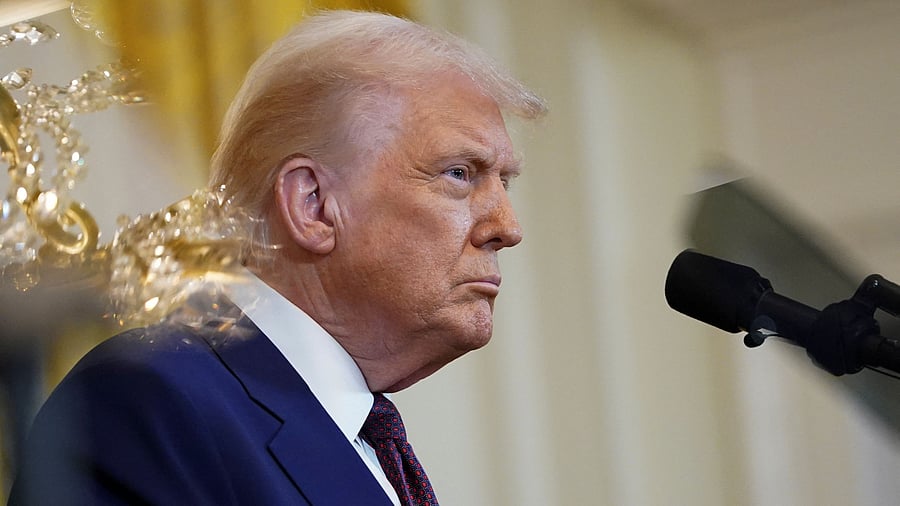
US President Donald Trump.
Credit: Reuters File Photo
By Kathryn Anne Edwards
For the first time, the Commissioner of the Bureau of Labor Statistics has been fired by the President of the United States for political reasons, launching the $30 trillion economy into uncharted and dangerous territory. It’s hard to overstate the peril that awaits.
The Bureau of Labor Statistics compiles what are perhaps the country’s most important economic reports, including the monthly employment and inflation reports. The department’s commissioner is appointed by the president, but the BLS describes its work as “independent” and “non-partisan.” This impartiality is key to the public and market’s trust in the data, which influences the price of money not just in the US but around the world and is touted as “gold standard” for economic statistics.
The commissioner President Donald Trump fired via a social media post is Erika McEntarfer, who was nominated to head the agency by former President Joe Biden in 2023. She was confirmed by the Senate in January 2024 by a vote of 86-8. To be clear, the problem is not that she was fired, but rather that she was slandered. After all, this is the same agency that produced data in recent months showing that inflation was tame and which the White House cheered.
And yet, Trump took to social media to charge, without evidence, that the monthly employment report for July that was released earlier Friday was “RIGGED” because it showed a rapidly weakening labor market. In the last three months, the economy added just 106,000 jobs, with May and June revised lower by a combined 258,000. That three-month stretch was the worst for job growth since the pandemic, and it happens to come as Trump’s chaotic tariff strategy paralyzes businesses, which are finding it impossible to plan ahead.
The peril facing the economy isn’t a potential recession; it’s losing highly reliable, accurate and transparent data on the health of the world’s largest economy. Think of it as the difference between flying into a storm and flying into a storm completely blind. To understand just how catastrophic this could be, it helps to compare the two versions of the world that led to this moment.
The first starts about 15 years ago, when the focus on tightening budgets following the global financial crisis recession hit the Bureau of Labor Statistics hard. Past commissioners, from both Republican and Democrat administrations, warned that the timely and accurate production of critical labor market data needs adequate funding. The weight of budget cuts and asking staff to do more with less, they warned, would eventually risk the accuracy of data. The monthly data releases continued uninterrupted, but issue arose. Some releases contained technical errors that needed correcting. And the monthly revisions, a routine and typically esoteric component of the monthly jobs report, came under intense scrutiny.
Credit: Bloomberg Opinion
The BLS has for decades published three versions of the jobs report over three months, with an initial estimate followed by two revisions in the subsequent two months. The report is based on large surveys that take significant time to collect and process, and BLS essentially publishes each stage of its work. Most of the time revisions are trivial, but in recent years had become quite large, suggesting a decline in the quality of production. As my Bloomberg Opinion colleague Justin Fox recently explained, when the BLS made a preliminary announcement last September that the annual benchmark revision would cut employment by 810,000 jobs (which was later revised downward to 598,000), then-candidate Trump claimed “the Harris-Biden Administration has been caught fraudulently manipulating Job Statistics to hide the true extent of the Economic Ruin they have inflicted upon America.”
After winning the election in November, such talk from Trump died down. But now, as he instigates a global trade war via unilateral tariffs, most economists are raising alarm bells. This trade war, they say, will increase prices for US consumers and hurt businesses that rely on imports. If households pull back on spending and businesses do the same on hiring, the labor market will take a big hit, risking recession.
The second version – Trump’s version - of the world is that the economy is BOOMING because tariffs are a beautiful policy and the only reason why the data don’t show it is because career statisticians (who were put into office with broad, bipartisan support) are conspiring against the president and single-handedly manipulating data to produce “fake numbers.”
So when the monthly jobs report fails to confirm Trump’s view that the economy is strong, firing the head of the BLS is either 1) clear and brazen scapegoating (and keep in mind, he is prohibited from firing his primary scapegoat, Federal Reserve Chair Jerome Powell), or 2) a career statistician was actually a politically motivated operative who successfully and single-handedly manipulated official government statistics (but not for the first six months of Trump’s second term, just this one).
Comparing these two realities is not just an exercise in illustrating the plausibility of which is actually happening with the economy and data, but what is at risk. Either we are at a critical juncture in the economy with a dangerously weak labor market that could quickly lead to a recession, or everything is perfect except the people who produce economic data. The former jeopardizes policymakers’ ability to quickly respond to a downturn and act before it leads to widespread economic damage, preventing the worst of business closures and job losses. The latter risks the president’s insistence that tariffs are good.
The next BLS commissioner will either be loyal to the data or loyal to the president, but whoever it is can’t be both. The economy will either end up with a watchdog or a lapdog.